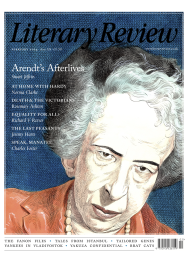Raymond Tallis
Whose Fault is it Anyway?
Determined: Life without Free Will
By Robert M Sapolsky
The Bodley Head 528pp £25
The case against free will is easily stated. Actions, we remind ourselves, are material events. All such events seem subject to the laws of nature, wired into causally connected sequences that emerged long before we were born or even thought of. Besides, we rely on a stitched-up physical reality to perform actions and to be confident that they will have their intended consequences. If, say, the laws of mechanics did not govern the interactions between my body and the material world, then I could not have walked upstairs to my study to start writing this review.
The biologist Robert Sapolsky’s witty, erudite, imaginative and deeply humane new book is a comprehensive rehearsal of the argument that free will is an illusion. Sapolsky assembles a vast body of evidence to make the case that ‘all we are is the history of our biology, over which we had no control, and of its interactions with environments, over which we also had no control, creating who we are in the moment’. Our actions are the product of a causal chain reaching back through our adolescence, childhood and foetal experiences to culture and evolution.
For Sapolsky, the brain is the key mediator of our behaviour. He draws widely and authoritatively on research showing how lasting changes in brain structure and function result from experiences and circumstances we have not chosen. But he is careful, indeed scrupulous, in his use of neuroscience. He takes great trouble to expose the irrelevance of the famous experiments, endlessly cited by determinists, of Benjamin Libet, John Dylan-Haynes and others showing that the brain commits to an action before people believe they have taken a decision to act. To focus on what he calls ‘the final three minutes of a movie’ – what happens immediately before we act – is to miss the true sources of our imprisonment, Sapolsky argues. Nevertheless, he believes that brain science explains why some people consistently make wrong decisions.
Some defenders of free will believe that recently science has created a new space for agency. According to quantum theory, the universe is indeterminate at the level of elementary particles. This, however, should offer little comfort, given that human beings are rather bigger than atoms. Attempts to scale up quantum

Sign Up to our newsletter
Receive free articles, highlights from the archive, news, details of prizes, and much more.@Lit_Review
Follow Literary Review on Twitter
Twitter Feed
Under its longest-serving editor, Graydon Carter, Vanity Fair was that rare thing – a New York society magazine that published serious journalism.
@PeterPeteryork looks at what Carter got right.
Peter York - Deluxe Editions
Peter York: Deluxe Editions - When the Going Was Good: An Editor’s Adventures During the Last Golden Age of Magazines by Graydon Carter
literaryreview.co.uk
Henry James returned to America in 1904 with three objectives: to see his brother William, to deliver a series of lectures on Balzac, and to gather material for a pair of books about modern America.
Peter Rose follows James out west.
Peter Rose - The Restless Analyst
Peter Rose: The Restless Analyst - Henry James Comes Home: Rediscovering America in the Gilded Age by Peter Brooks...
literaryreview.co.uk
Vladimir Putin served his apprenticeship in the KGB toward the end of the Cold War, a period during which Western societies were infiltrated by so-called 'illegals'.
Piers Brendon examines how the culture of Soviet spycraft shaped his thinking.
Piers Brendon - Tinker, Tailor, Sleeper, Troll
Piers Brendon: Tinker, Tailor, Sleeper, Troll - The Illegals: Russia’s Most Audacious Spies and the Plot to Infiltrate the West by Shaun Walker
literaryreview.co.uk